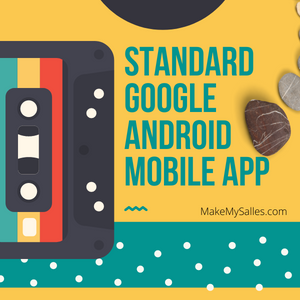Google Android Mobile App
High quality app with logo, splash screen and standard Design for Google Android Only on your Google Store Account – Interconnection from your WordPress Site
Is a mobile app better than a mobile website?
Mobile website vs. mobile app can be a heated debate.
Many people feel that you don’t need a mobile app, you just need a website that looks good on mobile devices. Others say that mobile apps have benefits that a website cannot provide. Who is right?
Everyone needs a responsive website that looks great on mobile. It’s not really that hard to get a responsive website, and there are no downsides.
People are going to view your website on their devices, and you need to support that. It’s obvious that you need a responsive website, but do you also need a mobile app? Is a mobile app better than your mobile website?
Let’s look at whether a mobile app or a mobile website is better for your business.
Mobile website pros and cons
A mobile website is usually not a separate website, it’s a responsive design that works for all screen sizes. Mobile visitors should be able to access most of the content you have on your full website, but in a way that is optimized for smaller screens.
I believe everyone should have a mobile website, so these pros/cons are really just for comparison to a mobile app.
Pros
- Inexpensive – usually included in the price of designing your website
- Works on all devices – you don’t need a separate site for iOS/Android
- Easy to setup – no submitting to app stores, you just need a domain and hosting
Cons
- No push notifications
- No offline access
- No app store presence
- Poor design can cause problems like:
- Performance issues
- Cluttered design
- Poor usability
Well designed mobile websites can be a huge business asset. Since almost 1/3 of internet traffic is mobile, it’s obvious you need one.
They are inexpensive to setup, available on all devices, and easy to maintain and update.
Where mobile websites fail
I’ve visited one too many websites on my phone that were poorly optimized for mobile, and made me immediately go elsewhere. Some mobile sites can be cluttered with ads, popups, and content you don’t need to see on mobile.
Mobile websites can also be over-optimized, trying to make it look and feel like a native app. This usually makes things worse, with choppy animations and over-designed layouts. There are lots of funny examples of people screwing up their mobile websites on the WTF mobile site.
Even big companies with plenty of resources are guilty of this. Click the image below on the left and you’ll see a site covered in so much crap it’s hard to even read the content. Perhaps worse is a site that is not responsive, so the text is unreadable on a phone, and they even have the nerve to show me a popup!
Mobile Web
Mobile App
A well designed mobile site can take care of many of these problems, but it still can’t do things a mobile app can do. You’ll see the images of a mobile app above on the right, where the content can use up 90% of the screen, making for a much nicer experience.
Let’s take a look at the advantages and disadvantages of a mobile app.
Mobile app pros and cons
Mobile apps can do things websites can’t, like push notifications and offline access, but they also have cons. They aren’t necessary for some people, for example if you are a casual mommy blogger you probably don’t need an app. However, many businesses can benefit from one, let’s look at the pros and cons.
Pros
- Push notifications – send text messages to your subscribers
- Offline access – read articles, listen to podcasts, or browse a product catalog while on an airplane
- Great performance – a well designed app can be faster than a website
- Less cluttered – this depends on the website design, but apps tend to have less stuff
- Get on the app stores – it’s another way to get in front of your customers, you also get a button on their homescreen
Cons
- Extra expense – while some apps are affordable ($49/mo for example) it’s still another cost
- Extra setup – you have to setup the app and submit to the app stores
Mobile apps can help your audience get to your content faster, and keep them engaged better. Sending push notifications is a huge advantage, whether you are publishing articles or selling products.
Apps are better for accessing content offline, such as listening to audio or reading an article on an airplane.
They can cost extra time and money, and not all businesses are prepared for that.
The winner
The winner depends on your business. For the casual blogger, the mobile website wins. For a company like Instagram, the mobile app wins.
For many businesses, the winner is a combination of both. A two-pronged mobile strategy can leverage both a mobile site and an app for maximum distribution of your content.
One example would be an online store. Why not let visitors purchase through your website, as well as an app? Churches can use an app to release updated sermon notes before the service, and recorded audio/video afterwards. Restaurants can offer updated menus, directions, and online ordering. Magazines can send push notifications when new articles are published.
Instead of one or the other, consider incorporating both into your mobile strategy.







Priya Srinivasan –
Best Standard Google Android Mobile App